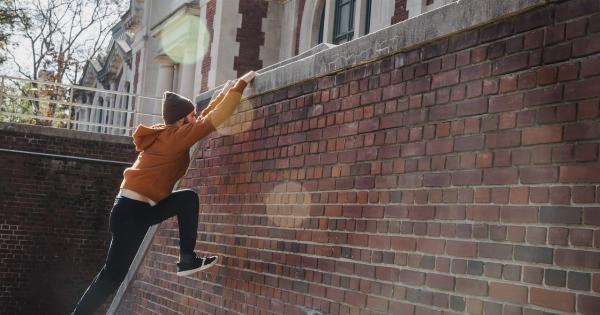Sleep is an essential biological process that plays a crucial role in maintaining physical and mental well-being. Adequate sleep is particularly important during adolescence, a period marked by significant physiological, emotional, and social changes.
Unfortunately, many adolescents struggle to get the recommended amount of sleep, leading to sleep deprivation. Sleep deprivation has been linked to various negative consequences, including impaired cognitive functioning, mood disturbances, and increased risk-taking behaviors.
One specific area where sleep deprivation has been found to have alarming effects is in the realm of sexual behavior. In this article, we will explore the reasons why sleep-deprived adolescents are more likely to engage in risky sexual behavior and the potential consequences of this issue.
The Link Between Sleep Deprivation and Risky Sexual Behavior
1. Impaired Decision-Making:.
Sleep deprivation affects the prefrontal cortex, a region of the brain responsible for decision-making and impulse control.
When adolescents do not get enough sleep, their ability to think critically and weigh the potential consequences of their actions becomes compromised. This impairment can lead to impulsive and risky decisions, including engaging in unprotected sexual activity or having sex with multiple partners without considering the potential risks involved.
2. Hormonal Imbalance:.
Lack of adequate sleep disrupts the delicate balance of hormones in the body. Sleep plays a crucial role in regulating hormone production, including those involved in sexual development and reproduction.
When sleep is insufficient, hormonal imbalances may occur, potentially leading to increased sexual desire and riskier sexual behaviors.
3. Increased Sensation Seeking:.
Sleep deprivation has been found to increase sensation seeking behavior among adolescents. Sensation seeking is characterized by a desire for novel and thrilling experiences.
When teenagers are sleep-deprived, they may actively seek out risky behaviors, including experimenting with drugs, engaging in promiscuous sexual encounters, or participating in unsafe sexual practices.
The Consequences of Engaging in Risky Sexual Behavior
1. Sexually Transmitted Infections (STIs):.
Engaging in unprotected sex increases the risk of contracting sexually transmitted infections, such as chlamydia, gonorrhea, or human papillomavirus (HPV).
Sleep-deprived adolescents who partake in risky sexual behavior may be less likely to prioritize safe sex practices, making them more vulnerable to contracting and spreading STIs.
2. Unintended Pregnancies:.
Lack of sleep can impair adolescents’ judgment and decision-making processes, leading to an increased risk of unintended pregnancies.
Sleep-deprived teenagers may be more likely to engage in unprotected sexual activity, neglect the use of contraception, or make poor contraceptive choices, increasing the likelihood of unintended pregnancies and the potential disruptions they can cause in their lives.
3. Poor Emotional Well-being:.
Engaging in risky sexual behaviors can negatively impact adolescents’ emotional well-being. Feelings of regret, guilt, or shame may arise as a result of participating in unsafe sexual encounters.
Moreover, the potential consequences of STIs or unintended pregnancies can lead to significant emotional distress and long-term mental health issues.
Strategies to Promote Healthy Sleep Habits and Prevent Risky Behaviors
1. Education and Awareness:.
Providing comprehensive sex education programs that address the potential consequences of risky sexual behavior can help adolescents understand the importance of making informed decisions and practicing safe sex.
These programs should also incorporate information about the impact of sleep deprivation on decision-making processes and sexual behaviors.
2. Sleep Hygiene Education:.
Teaching teenagers about the importance of healthy sleep habits and the detrimental effects of sleep deprivation can encourage them to prioritize adequate sleep.
Educating adolescents about proper sleep hygiene, such as establishing a consistent sleep schedule, creating a sleep-friendly environment, and avoiding stimulants before bed, can contribute to improving their overall well-being and decision-making abilities.
3. Supportive Environments:.
Schools, families, and communities should create supportive environments that prioritize sleep health.
Implementing policies that limit excessive homework, extracurricular activities, or early school start times can help ensure that adolescents have enough time to get the recommended hours of sleep. Additionally, open communication channels between parents, educators, and teenagers can offer a platform to discuss the importance of sleep and address any issues or concerns regarding sleep deprivation.
Conclusion
Sleep deprivation among adolescents has far-reaching consequences, impacting various aspects of their lives, including their sexual behaviors.
Lack of sleep impairs decision-making, increases impulsivity, and disrupts hormonal balance, all of which contribute to a higher likelihood of engaging in risky sexual behavior. By understanding the connection between sleep deprivation and risky sexual behaviors, we can take proactive measures to promote healthy sleep habits among teenagers.
Educating adolescents, fostering supportive environments, and emphasizing the importance of sleep hygiene can help mitigate the potential risks and consequences associated with sleep deprivation and risky sexual behavior.






























